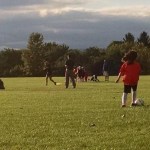society
I've done yet another piece for The Conversation, this one expanding on something I've been saying in interviews promoting Eureka: that knowing the process of science can help people sort good science from bad. In this particular case, I take the somewhat #slatepitch-y angle that the recent high-profile unraveling of the BICEP2 experiment's claim to detect primordial gravitational waves is a good thing:
Along with general disappointment, the new announcement has prompted discussion of what, if anything, the BICEP2 team did wrong. Many commentators fault them for over-hyping their results to…
I've seen a lot of reshares of this report about the long-term effect of gender bias in elementary math, which comes from an NBER working paper about a study of Israeli schools. The usual presentation highlights one specific result, namely that on a math test graded by teachers who knew the names of the students, boys outscored girls, but a blinded test saw girls outscore boys.
This sounds pretty damning, but also kind of puzzling-- is there really that much room for partial credit in elementary school math? Looking at the actual paper (which you can get emailed to you if you have a .edu…
I've seen a bunch of re-shares of this Vox profile of a "Men's Rights Activist" on various social media channels, with reactions varying from "This is fascinating" to "Boooo-ring." I thought it was sort of interesting, but not really in the way it was intended to be. The thing I found most striking the way the author, Emmett Rensin, introduces "Max":
In the popular imagination, Men's Rights Activists are "neckbeards": morbidly obese basement-dwellers with a suspect affection for My Little Pony. But Max is remarkably unassuming in appearance, handsome enough and normally tall; equally…
Probably the dumbest person I've ever met in my life was a housemate in grad school. I didn't do my lab work on campus, so I wasn't living in a neighborhood where cheap housing was rented to students, but in a place where folks were either genuinely poor, or in the market for very temporary lodgings while they looked for something better. There were low-income housing units across the street, and also an apartment building full of families who didn't quite qualify for welfare.
This particular guy rented one of the other rooms in the house, and worked a series of unskilled jobs-- assistant on…
Yesterday's Open Letter to Neil deGrasse Tyson struck a chord with a lot of people, and has spread a good distance on social media, which is gratifying. Given the delocalized nature of modern social media, though, it means I'm having essentially the same argument in five different places via different platforms. In the interest of consolidating this a tiny bit, then, let me post some follow-up stuff here.
-- The most charitable interpretation of the tweet I objected to is that it's meant as praise for good students. The idea being that good students will learn in the absence of good teaching…
Dr. Tyson:
(I find the faux-familiar thing people do with "open letters" really grating, so I'm not going to presume to call you "Neil" through the following...)
First of all, I should probably say "Thanks," because I'm using some of your material in my class this term-- I had them read Stick in the Mud Astronomy, and contrast it with wacky Ancient Alien stuff, and gave them a second assignment based on Manhattanhenge, so that stuff's great. And I'm psyched to hear you've gotten your own talk show. So, you know, that stuff's awesome. Thanks.
And I should also note that while I haven't always…
Two language-related items crossed in the Information Supercollider today: the first was Tom's commentary on an opinion piece by Robert Crease and Alfred Goldhaber, the second Steven Pinker on the badness of academic writing.
All of them are worth reading, and I only have small dissents to offer here. One is that, unlike Tom and Crease and Goldhaber, I'm actually just fine with the popular usage of "quantum leap" for a particularly dramatic change. Yes, I realize that the canonical "quantum jump" is the smallest possible change, but I think that's putting too much emphasis on only one aspect…
Modern media being what it is, I should get out in front of this, so: I am guilty of putting words in Einstein's mouth. I mean, go watch my TED-Ed video on particles and waves, or just look at the image up top-- that very clearly shows Einstein saying words that he probably never said. And it's my fault.
Well, OK, I didn't actually put those words in his mouth-- the animator did that. What I wrote is "Einstein himself described [the photoelectric effect] as the only truly revolutionary thing he did." Which isn't really a quote, but a paraphrase. And it's really a paraphrase of something…
The London School of Economics has a report on a study of academic refereeing (PDF) that looked at the effect of incentives on referee behavior. They found that both a "social incentive" (posting the time a given referee took to turn around the papers they reviewed on a web site) and a cash incentive ($100 Amazon gift card for meeting a 4-week deadline) worked to increase the chance of a referee accepting a review request, and improved the chances that they would meet the deadline. The effect of cash was a little smaller for tenured faculty, but they were slightly more susceptible to the…
There was a article in Scientific American about diversity in STEM collecting together the best demographic data available about the science and engineering workforce. It's a useful collection of references, and comes with some very pretty graphics, particularly this one, showing the demographic breakdown of the US population compared to the science and engineering fields:
Demographic breakdown of general population vs. science and engineering, from the Scientific American post.
This is a very professionally made graphic, but also misleading in the worst way. When I first looked at this, I…
Steven Pinker has a piece at the New Republic arguing that Ivy League schools ought to weight standardized test scores more heavily in admissions. this has prompted a bunch of tongue-clucking about the failures of the Ivy League from the usual suspects, and a rather heated concurrence from Scott Aaronson. That last finally got me to read the piece, because I had figured I would be happier not reading it, but I wanted to see what got Scott so worked up.
Sadly, my first instinct was correct. It starts off well enough, taking down an earlier anti-Ivy League piece by William Deresiewicz for being…
Via a whole bunch of people on social media, there's a new study of gender roles in academia, which the Washington Post headlines "Study: Male scientists want to be involved dads, but few are". This is not inaccurate. Some quotes that jumped out at me:
“Academic science doesn’t just have a gender problem, but a family problem,” said Sarah Damaske, a sociology professor at Penn State and one of the report’s authors. “We came to see that men or women, if they want to have families, are likely to face significant challenges.”
The study, Damaske said, showed there was potential for change, in…
Over at FiveThirtyEight, they have a number-crunching analysis of the number of papers (co)authored by women in the arxiv preprint server, including a breakdown of first-author and last-author papers by women, which are perhaps better indicators of prestige. The key time series graph is here:
Fraction of women authors on the arxiv preprint server over time, from FivethirtyEight.
This shows a steady increase (save for a brief drop in the first couple of years, which probably ought to be discounted as the arxiv was just getting started) from a bit over 5% women in the early 90's to a bit…
Lance Mannion has a really nice contrast between childhood now and back in the 1970's that doesn't go in the usual decline-of-society direction. He grew up not too far from where I now live, and after describing his free-ranging youth, points out some of the key factors distinguishing it from today, that need to be accounted for before lamenting the lack of kids running around outside:
-- A lot of the houses in "the old neighborhood" are still owned by the people who owned them back in the day, so the only kids around are visiting grandkids,
-- Those homes that are occupied by families with…
This Alberto Cairo piece on "data journalism" has been kicking around for a while, and it's taken me a while to pin down what bugs me about it. I think my problem with it ultimately has to do with the first two section headers in which he identifies problems with FiveThirtyEight and Vox:
1. Data and explanatory journalism cannot be done on the cheap.
2. Data and explanatory journalism cannot be produced in a rush.
The implication here is that "data and explanatory journalism" is necessarily a weighty and complicated thing, something extremely Serious to be approached only with great care.…
I've seen a few links passed around to this Tom Siegfried post about science literacy, which is mostly a familiar story about how polls show most Americans giving incorrect answers to science questions. The sort of stuff you find in the NSF's Science and Engineering Indicators report. What's getting the social-media attention, though, is this paragraph near the end:
In fact, I’d contend (and have contended) that the problem with science education is not that it fails to inculcate enough facts, but that it tries to inculcate too many. Science classes in high school and intro classes in…
A collection of miscellaneous stuff with an academic inclination from the past week or so:
-- We gave an exam last night in introductory E&M (I'm teaching one of five sections this term), so we've spent a lot of time this week on exam review. One thing that might be worth mentioning here is the way I run review sessions, which I don't think is entirely original to me, but which generally gets a "Huh. That's a good idea." when I explain it to other faculty, so wherever I got it from isn't well known.
What I do is: at the start of the review session (either a regular class period given over…
Yesterday's frat boy post prompted some interesting discussion, one piece of which is a response from Matt "Dean Dad" Reed (also at Inside Higher Ed), who overlapped with me at Williams for a year, but had a very different reaction to the social scene there. His take mirrors mine from the other side, though, which suggests I'm not wildly off base.
The other chunk is a comment exchange on Facebook where some colleagues mentioned the problem of social exclusivity as an issue that I didn't address. And that's true-- as I was at a school without fraternities, where all organizations were formally…
I was invited to a dinner last night hosted by one of the umbrella organizations for fraternities on campus, with a stated goal of improving communication between faculty and frats. It ended up being kind of a weird crowd-- most of the non-students there were Deans of one sort or another; I think there was only one other regular faculty member there. I'm not sure quite how they drew up the invite list, but I suspect the two of us are probably among the most sympathetic faculty members-- I went to a school without frats, but the rugby club was functionally equivalent, and the other guy proudly…
Kevin Drum and Aaron Carroll report on a new study of the effect of new grocery stores opening in "food deserts" in poor neighborhood. The study is paywalled, so I can't speak to the whole thing, but both of them quote similar bits making the same point: no statistically significant effects on the BMI of people in the neighborhood, and very few signs of healthier eating in general.
This is one of those studies that probably belongs in the Journal of "Well, Yeah...", because it doesn't surprise me a bit. Not for reasons that can be addressed via policy measures-- Drum quotes the study saying "…



